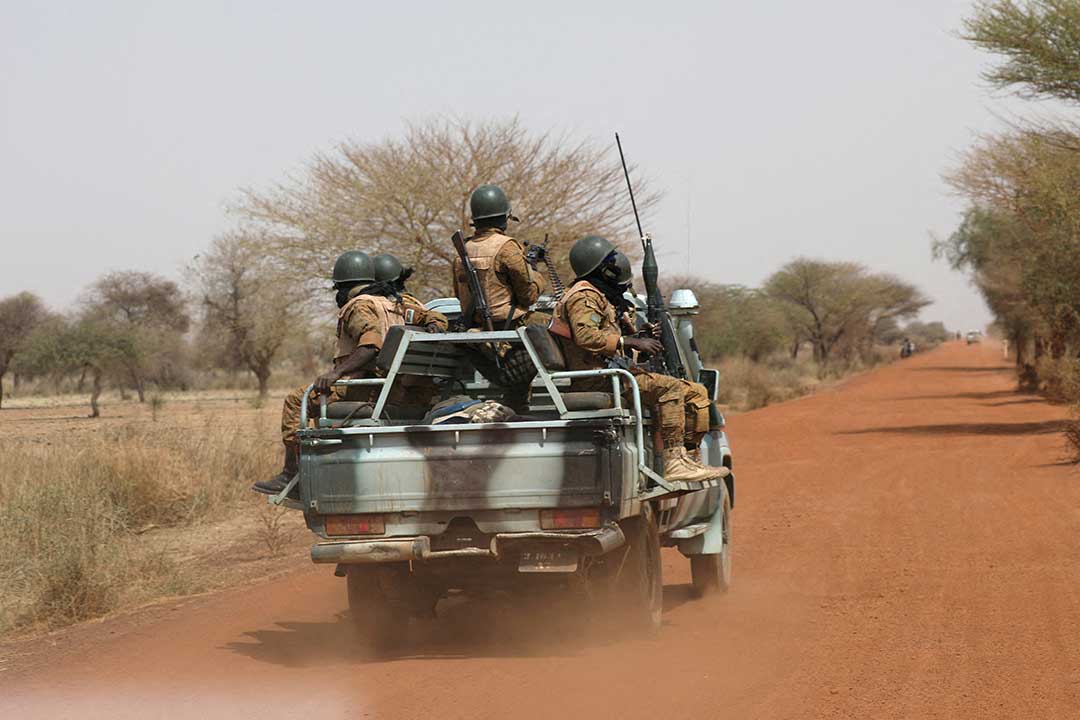Joint West African Operation Confronts Terrorists
ADF STAFF
As Sahel-based terror groups push south, some West African nations have joined forces to push back.
Burkina Faso, Côte d’Ivoire, Ghana and Togo recently conducted a joint military operation in response to increased attacks by Islamist insurgent groups.
Dubbed Operation Goundalgou-4, it included nearly 5,700 Soldiers deployed from November 21 to 27, 2021, in five regions of Burkina Faso that border the other participating countries.
Burkinabe Security Minister Maxime Kone called the operation a success.
“This pooling of staff and resources has enabled our defense and security forces to carry out several patrol operations, to cordon off areas followed by searches, identity checks and to destroy the bases of armed terrorist groups,” he said in a November 30 news conference in the capital, Ouagadougou.
The 5,670 troops included 2,050 from Burkina Faso, 1,851 from Ghana, 969 from Togo and 800 from Côte d’Ivoire. The operation deployed 881 vehicles and had air support.
Kone reported “about 30 terrorists” were killed in clashes in the forests of Burkina Faso’s Southwest and Cascades regions — areas that border Côte d’Ivoire.
“This operation made it possible to destroy five terrorist bases, to arrest 300 suspects — several of whom were wanted — to seize 53 firearms, large quantities of ammunition, and 144 vehicles and motorcycles, as well as a significant quantity of narcotics,” he said.
Kone also said the joint force is considering measures to track down terrorist group informants and intelligence agents.
Terror attacks in Burkina Faso have grown increasingly common and deadly since 2015, as groups linked to al-Qaida and the Islamic State group have killed more than 2,000 Burkinabe and forced more than 1.4 million to flee their homes.
Kone praised Goundalgou-4 as a model, saying it occurred within the framework of the Accra Initiative, which allows its member countries to jointly carry out operations to combat insecurity in the Gulf of Guinea subregion.
Signed in 2017 by Benin, Burkina Faso, Côte d’Ivoire, Ghana and Togo, the Accra Initiative was a response to the growing threat of violent extremism. In 2019, Mali and Niger were admitted as observers, given their proximity to the coastal states and their experience with Sahel extremists.
Sahel terror cells have been moving toward the Gulf of Guinea for years, according to William Assanvo, a Côte d’Ivoire-based researcher with the Institute for Security Studies.
“All coastal countries are exposed to this threat, at least the countries which border Burkina Faso and Mali,” he told Radio France Internationale.
The aim of the Accra Initiative is to prevent terrorism from spilling from the Sahel and Nigeria into West Africa’s coastal nations and to address organized crime in border areas.
Between 2018 and 2019, the Accra Initiative neighbors launched three similar operations — Goundalgou 1 through 3.
Kone described those efforts as addressing “areas facing the emergence of armed terrorist groups like Boko Haram, the Group to Support Islam and Muslims and the Islamic State in the Greater Sahara.”
He also accused extremists of an array of illegal activities in the subregion.
“The climate of insecurity maintained by transnational crime, trafficking of all kinds, armed robberies, kidnappings and assassinations justified the conduct of this multilateral joint operation,” he said.
The lure of some of Africa’s fastest-growing economies is among the reasons cited by the Armed Conflict Location & Event Data Project (ACLED) for violent extremist organizations to expand toward the Gulf of Guinea.
“A broader trend in the sub-region suggests a solidifying nexus between militancy and banditry which could be translated into ‘jihadization of banditry,’ an alliance of convenience with mutual benefits,” ACLED Senior Researcher Héni Nsaibia wrote in a report on insecurity in Burkina Faso’s southwest. “Militants may co-opt existing criminal networks by providing more advanced and heavy weaponry and hard currency in order to make inroads where they have a limited support base and presence.”


Comments are closed.